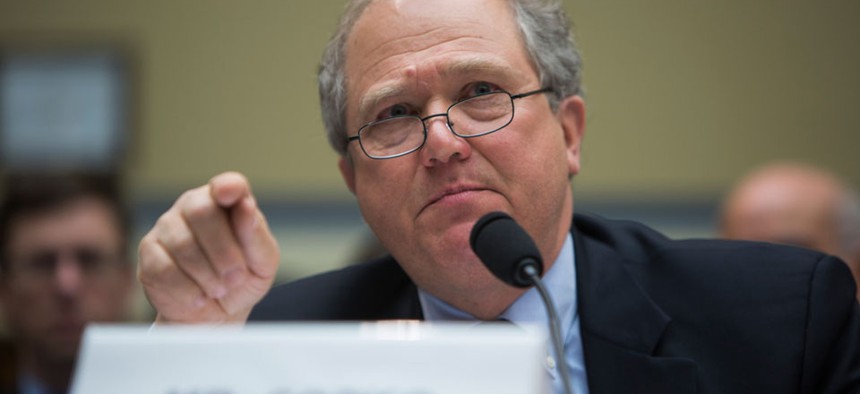
SIGAR
Watchdog Taps Contractors for Lessons on Rebuilding Afghanistan
Reconstruction still vital after U.S. troops leave in December, IG John Sopko says.
U.S. contractors on the front lines of the mission know better than “the happy talk coming out” of Afghanistan, said John Sopko, the special inspector general for Afghanistan reconstruction.
On Tuesday, Sopko tasked a major contractors group with supplying lessons learned and best practices to help the U.S. effort to rebuild and stabilize the country against terrorism. A similar request to the Pentagon, State Department and U.S. Agency for International Development produced a “shocking result,” he said. “I asked for their top 10 successful programs and their 10 least successful, and none offered anything but general improvements—with no specifics or direct causal links,” he said. “In an era of declining funding, we have to know what works and what doesn’t.”
Speaking at a lunch put on the Professional Services Council, an Arlington-Va.-based association of major contractors, Sopko praised the role of contractors in U.S. government work from supplying Revolutionary War troops to helping invent the atomic bomb.
In Afghanistan, they are expected to play a continuing role after most U.S. troops officially depart at the end of 2014, and “many have made the ultimate sacrifice,” Sopko said, citing three contractors who died earlier this month from a suicide bombing in Kabul. After the September 2013 truck bomb attack on the U.S. consulate in Herat, Sopko’s representative there told him that contractors were the first to engage in a one-hour gun fight that prevented further enemy penetration of the complex -- a fact not reported at the time, he said.
The U.S. total investment in Afghanistan of more than $100 billion since 2002 is the “most costly effort to rebuild a nation in U.S. history -- more than what we give to Israel, Egypt and Pakistan combined,” Sopko said. The U.S. will leave when the funds fall to $250 million, but with $20 billion still in the pipeline, U.S. agencies will be there for some time, he said. Only 20 percent of the country, however, is currently accessible to SIGAR’s 50 auditors there on the ground due to continuing combat, he said, a drop from 50 percent in 2009.
The urgency of the approaching troop departure has prompted SIGAR to accelerate audits, having released 30 reports in the past quarter, compared with about four during that time frame in the past.
The dialogue with contractors comes as SIGAR is butting heads with a Marine General with the International Security Assistance Force in a public relations battle. A Jan. 30 USA Today story said Gen. Marine Gen. Joseph Dunford sought to blunt the impact of a coming SIGAR report finding construction defects in a $600,000 U.S.-built hospital by releasing an advance statement praising the hospital -- even though it is located in an area too dangerous to inspect. Last Thursday, Sen. Jeanne Shaheen, D-N.H., wrote to Dunford demanding an explanation for actions she said undermine SIGAR.
The general’s moves were “silly and waste money,” Sopko told Government Executive. “They should spend more time fixing problems and less time spinning to make themselves look better.” What would be less silly, Sopko added, is if such tactics by subjects of SIGAR audits introduce “any obstructionism in us going out to do our work, or creating a chilling effect on people talking to us.”
Explaining that SIGAR’s 200 employees are auditors “not cheerleaders,” Sopko defended the use of the press and social media to promote the work of inspectors general. “Oversight is most effective when it’s public,” he said. IG and Government Accountability Office reports “often fall in the black hole of Washington background noise and go unnoticed, useful to no one, and have no impact.” His team, he added, “didn’t give up higher-paying jobs to kill a bunch of trees. Press reports spur agency officials to take corrective action,” with the added benefit of increased whistleblower hotline tips on waste and fraud.
What is necessary to stabilize Afghanistan, he said, is implementation of the more than 700 recommendations, such as those involving safeguarding investments against theft and misuse of funds. Contracts should be “sustainable,” he added, noting that some contracts allow purchase of buses but don’t pay for their maintenance.
Among the biggest issues affecting contractors has been the Afghan government’s attempts to withhold $900 million in bogus taxes on 43 contractors or subcontactors. When Sopko personally raised this issue with U.S. commanders and embassy personnel, “they didn’t want to hear it,” he said, adding that he personally visited the Afghan border with Uzbekistan to see the trucks carrying fuel being held up while such taxes are paid. “Contractors are faced with not knowing whether it’s a bribe or a tax, and we don’t want them in that position or they won’t want to work there,” Sopko said.
Prohibitions against such a tax and requirements that U.S. aid to the Afghan government be cut as reimbursement for the illegal tax were included, Sopko noted, in both the fiscal 2014 National Defense Authorization Act and January’s catchall spending bill. “It’s a good example of how SIGAR and the contractor community work together.”
NEXT STORY: Negotiating Your Salary Without Playing Hardball







